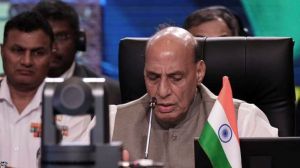Heavens won’t fall if vote on account now, full budget after polls: S Y Quraishi
In 2008, elections to three northeastern states were very close to the presentation of the budget, but at the time no one made it an issue.
 Former Chief Election commissioner S Y Quraishi at the Indian Express office (Express Photo)
Former Chief Election commissioner S Y Quraishi at the Indian Express office (Express Photo)
Former chief election commissioner S Y Quraishi speaks to The Indian Express on the propriety of advancing the date of the budget.
What do you think of the government’s idea of scheduling an early budget, bang in the middle of the polling schedule for five states?
I don’t have the competence to judge whether an early budget is a good thing from an economist’s point of view, but as an election commissioner, I can speak from my six years’ experience. It was twice that polling in state elections came close to election dates during my tenure. In 2008, elections to three northeastern states were very close to the presentation of the budget, but at the time no one made it an issue. Then in 2012, the same set of states as now went to polls, and we were worried about the phasing of the polls and populist announcements that could possibly be made in the budget then. But then the government of the day itself postponed the budget by a fortnight to March 16 and… we could phase it comfortably. But for state elections, the EC always tells states to have votes-on-account at election time, that is the norm. Constitutionally, there is no difference between state and central budgets, so the same convention must be valid.
Does the advancement violate the model code of conduct?
There is a need to maintain the spirit of the model code of conduct. Even if it is not decreed as law, an appearance of fairness should be made. As a senior leader [Devi Lal] had said, [one] must be careful about lok laaj and not just lok raj, so appearances matter, and there is a conflict here. A clause in chapter 7 of the model code says very clearly that no new policy or announcement will be made that could disadvantage parties not in power and give an edge to parties in power… The budget announcement in my view does fall in this category of announcements.
In the instances you have mentioned, the budget dates were unchanged. Here the date has been advanced. So, should the EC intervene proactively?
It is being said that the government told the EC in November about the advancement. If the government had told the EC a year earlier, they could have planned better… It could be argued that the heavens won’t fall if the budget is presented earlier, but similarly, heavens won’t fall if it is not and a vote on account is [presented] in its place, with the full budget after the polling.
After the SC ruling on the role of religion while making political appeals, it has been left to the EC to interpret who is invoking religion.
The Supreme Court has only clarified what was in the law, the Representation of the People Act, section 123(3). But it was a very good that it has been underlined. It is a good reminder of the consequences… But I have problems on what would happen if people at the bottom of the ladder invoke their rights to representation. Will that be a violation? Some of that is a little unclear.
How exactly?
I mean that the Supreme Court, while knowing best what it should do, by not reviewing the Hindutva judgment may have again left room for doubt and confusion. When Manohar Joshi’s election was set aside by Bombay High Court because he said Maharashtra would be the first Hindu state — and that was set aside by the Verma Hindutva judgment — are we now opening the doors for ambiguous interpretation? So if someone says UP will be the first such-and-such state, is it allowed to be treated as within the law if s/he does not ask for a vote but does all else in the name of religion? That is my worry…
Are rules about hate speech defined clearly for EC to act?
Yes, those rules are clear. What the officials need is protection against those very parties that could return to power and pressurise them.






- 01
- 02
- 03
- 04
- 05

























